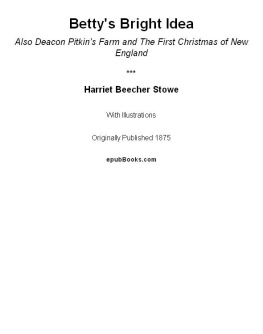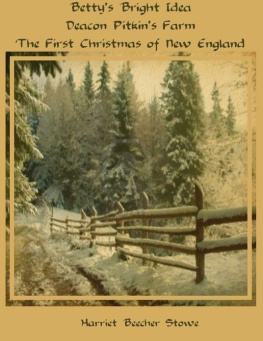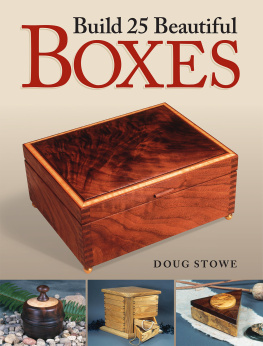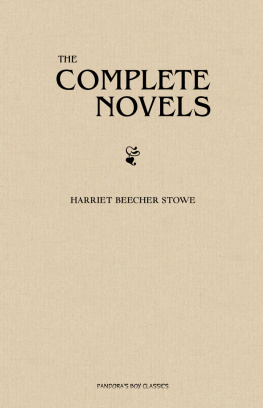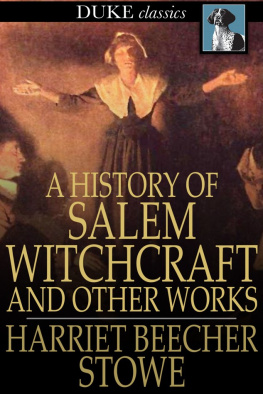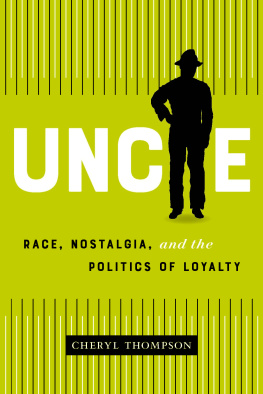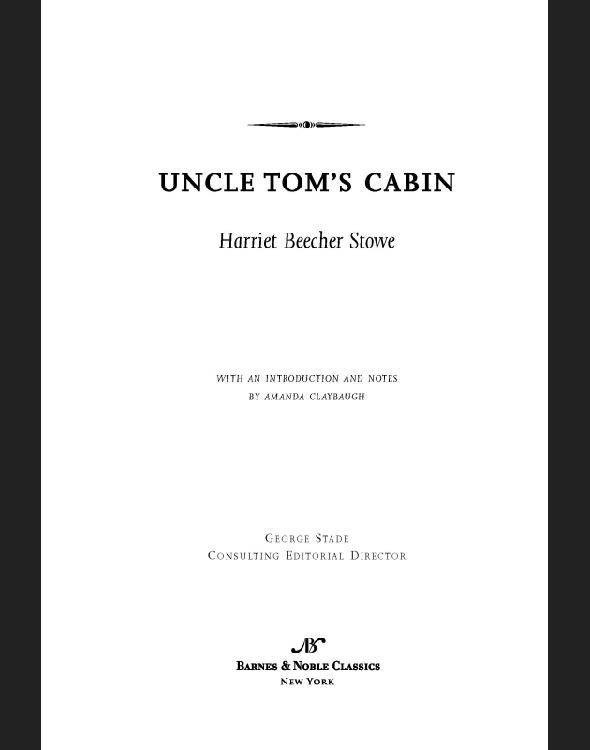
Table of Contents
FROM THE PAGES OFUNCLE TOMS CABIN
Tom is an uncommon fellow; he is certainly worth that sum anywheresteady, honest, capable, manages my whole farm like a clock. (page 3)
Eliza made her desperate retreat across the river just in the dusk of twilight. The gray mist of evening, rising slowly from the river, enveloped her as she disappeared up the bank, and the swollen current and floundering masses of ice presented a hopeless barrier between her and her pursuer. (page 62)
I dont know anything about politics, but I can read my Bible; and there I see that I must feed the hungry, clothe the naked, and comfort the desolate; and that Bible I mean to follow. (page 79)
All men are free and equal in the grave, if it comes to that. (page 113)
As to putting them on any sort of equality with us, you know, as if we could be compared, why, its impossible! Now, St. Clare really has talked to me as if keeping Mammy from her husband was like keeping me from mine. Theres no comparing in this way. Mammy couldnt have the feelings that I should. Its a different thing altogether,of course it is,and yet St. Clare pretends not to see it. And just as if Mammy could love her dirty little babies as I love Eva! (page 172)
Religion! Is what you hear at church religion? Is that which can bend and turn, and descend and ascend, to fit every crooked phase of selfish, worldly society, religion? Is that religion which is less scrupulous, less generous, less just, less considerate for man, than even my own ungodly, worldly, blinded nature? No! When I look for a religion, I must look for something above me, and not something beneath. (page 181)
Ive felt that I would be glad to die, if my dying could stop all this misery. I would die for them, Tom, if I could. (page 272)
My soul ant yours, Masr! You havent bought it,ye cant buy it! Its been bought and paid for, by one that is able to keep it. (page 353)
I ant a grain afeard to die. Id as soon die as not.Ye may whip me, starve me, burn me,itll only send me sooner where I want to go. (page 375)
Liberty!electric word! What is it? Is there anything more in it than a namea rhetorical flourish? Why, men and women of America, does your hearts blood thrill at that word, for which your fathers bled, and your braver mothers were willing that their noblest and best should die? Is there anything in it glorious and dear for a nation, that is not also glorious and dear for a man? (page 378)
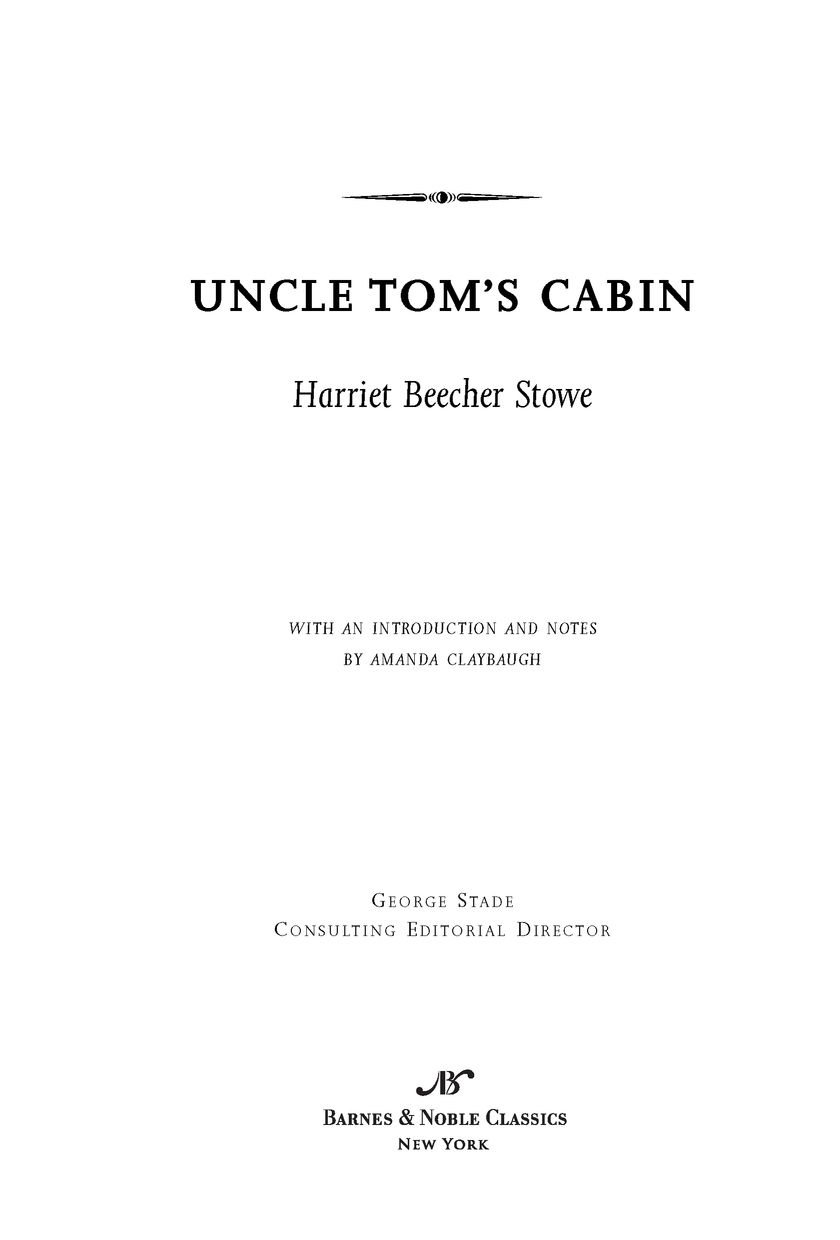
Published by Barnes & Noble Books
122 Fifth Avenue
New York, NY 10011
www.barnesandnoble.com/classics
Uncle Toms Cabin was serialized between 1851 and 1852, and
published in volume form in 1852.
Originally published in mass market format 2003 by Barnes & Noble Classics
with new Introduction, Notes, Biography, Chronology, Inspired By,
Comments & Questions, and For Further Reading.
This trade paperback edition published in 2005.
Introduction, Notes, and For Further Reading
Copyright 2003 by Amanda Claybaugh.
Note on Harriet Beecher Stowe, The World of Harriet Beecher Stowe and Uncle Toms Cabin, Inspired by Uncle Toms Cabin, and Comments & Questions
Copyright 2003 by Barnes & Noble, Inc.
All rights reserved. No part of this publication may be reproduced or transmitted in any form or by any means, electronic or mechanical, including photocopy, recording, or any information storage and retrieval system, without the prior written permission of the publisher.
Barnes & Noble Classics and the Barnes & Noble Classics
colophon are trademarks of Barnes & Noble, Inc.
Uncle Toms Cabin
ISBN-13: 978-1-59308-121-8
ISBN-10: 1-59308-121-9
eISBN : 978-1-411-43338-0
LC Control Number 2004112681
Produced and published in conjunction with:
Fine Creative Media, Inc.
322 Eighth Avenue
New York, NY 10001
Michael J. Fine, President and Publisher
Printed in the United States of America
QM
7 9 10 8 6
HARRIET BEECHER STOWE
Harriet Beecher Stowe was born on June 14, 1811, in Litchfield, Connecticut, to Lyman Beecher, a Calvinist preacher and activist in the antislavery movement, and Roxana Foote, a deeply religious woman who died when Stowe was four years old. Precocious and independent as a child, Stowe enrolled in the seminary run by her eldest sister, Catharine, where she received a traditionally male education. At the age of twenty-one, she moved to Cincinnati to join her father, who had become the president of Lane Theological Seminary, and in 1836 she married Calvin Ellis Stowe, a professor at the seminary and an ardent critic of slavery. The Stowes supported the Underground Railroad and housed several fugitive slaves in their home. They eventually moved to Brunswick, Maine, where Calvin taught at Bowdoin College.
In 1850 Congress passed the Fugitive Slave Law prohibiting assistance to fugitives. Stowe was moved to present her objections on paper, and in June 1851 the first installment of Uncle Toms Cabin appeared in the antislavery journal National Era. The forty-year-old mother of seven children sparked a national debate and, as Abraham Lincoln is said to have noted, a war.
Uncle Toms Cabin (or, Life Among the Lowly) met with mixed reviews when it appeared in book form in 1852 but soon became an international bestseller. Some critics dismissed it as abolitionist propaganda, while others hailed it as a masterpiece. The great Russian novelist Leo Tolstoy praised Uncle Toms Cabin as flowing from love of God and man. Stowe presented her sources to substantiate her claims in A Key to Uncle Toms Cabin: Presenting the Original Facts and Documents Upon Which It Is Based, published in 1853. Another antislavery novel, Dred: A Tale of the Great Dismal Swamp, appeared in 1856, but was received with neither the notoriety nor the success of Uncle Toms Cabin.
Stowe fueled another controversy in The True Story of Lady Byrons Life (1869), in which she accused the poet Lord Byron of having an incestuous love affair with his half-sister, Lady Byron. She also took up the topic of domestic culture in works that include The New Housekeepers Manual (1873), written with her sister Catharine. Stowe died on July 1, 1896, at age eighty-five, in Hartford, Connecticut.
THE WORLD OF HARRIET BEECHER STOWE AND UNCLE TOMS CABIN
| 1619 | The first Africans are brought to Jamestown, Virginia, and other English colonies in America. |
| 1638 | The New England slave trade begins in Boston. |
| 1661 | The Black Codes legalize slavery in Virginia. |
| 1688 | Members of the Society of Friends protest slavery in German- town, Pennsylvania. |
| 1706 | In his tract The Negro Christianized, Puritan clergyman Cotton Mather argues for the equality of blacks. |
| 1775 | A group of Quakers founds the first Abolition Society in Philadel phia. |





